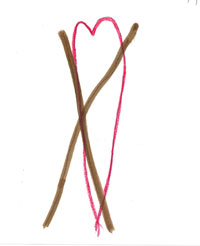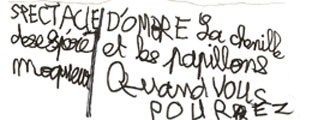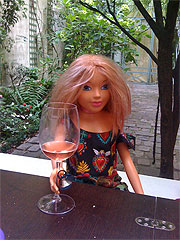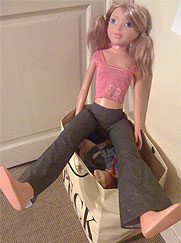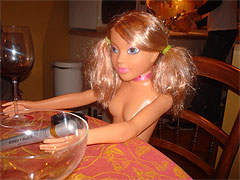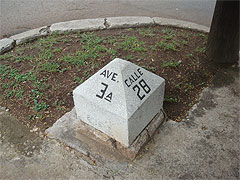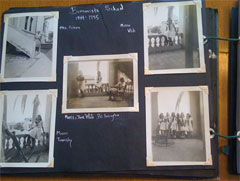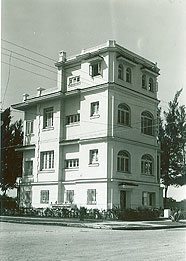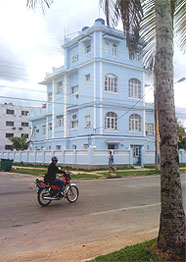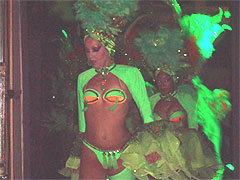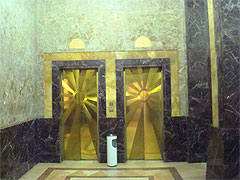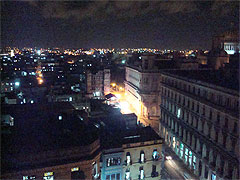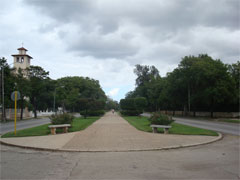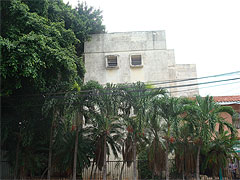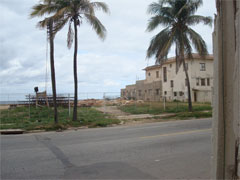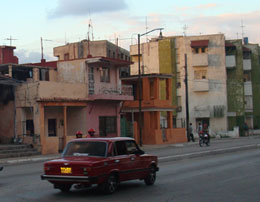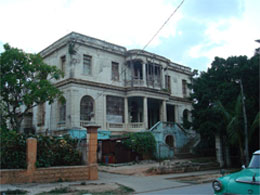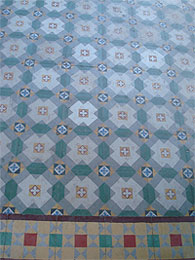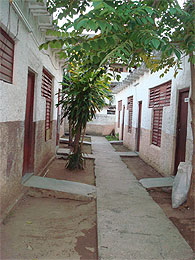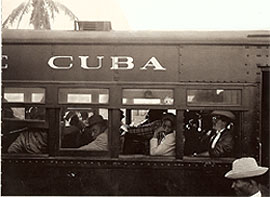Garbo Days
You know I love those two little rug-rat creatures of mine. They furnish dozens of adorable moments each day, doing or saying something funny or sweet. The simple extension one of their peach-soft hands upward toward me, a gesture of such complete trust, is sometimes all it takes to wet my eyes and thrust me into a state in awe. How did I ever have such beautiful children? I must have done something good.

However there are just as many dozen moments in the day when I would just like them to please be quiet and go away and leave me alone. If you listen closely, you can hear me parrot Greta Garbo under my breath, “I want to be alone.
I want to be alone.”
I’m not the first woman to know this paradox, and I won’t be the last.
You can imagine, then, the gladness and joy I experienced when one of the presents under the Christmas tree for Mère Noel was De-facto’s offer to take Short-pants and Buddy-roo to the country for a few days – without me.
He knows my fondness for going to the country house wanes in winter. It’s a lot of work to open and close the house in the warmer months, but in the cold weather that work is augmented by all things that must be undone and then done again to protect pipes and water tanks. Not to mention arriving to an unheated house. It takes at least two days for the wood stove to truly warm the walls and you have to let the fire die before you leave. The visit, then, is book-ended by hours of hovering and shivering and wearing mittens inside. My idea of nothing to do.
Late on Christmas Day afternoon I shut the trunk and waved as they drove away, and I have been alone, in my home, without another creature stirring for four days. Four days of solitude. Four days of freedom.
The quiet that stretches its waking arms throughout the apartment is delicious. I hear only the muffled voices of people in the street, an occasional sound of a neighbor in the hall, a nearby church bell ringing. No pattering feet. No screaming and crying and “Mama, watch this!” No voices in stereo vying for attention.
There are no marbles, pet-shops-creatures, Barbie shoes or other small, unidentified pieces of plastic left on the floor to torture my bare morning feet. No toys or dirty stuffed animals, no pretend stores, schools, or cars constructed of chairs, pillows and blankets to navigate when crossing my living room. Absolutely no sign of that big doll, often splayed on the couch. I’ve relegated her to a far corner upstairs.
No interruptions when I’m in the middle of something; that means complete privacy during all ablutions and eliminations.
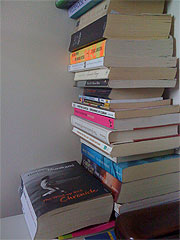
It’s paradise.
What to do with all that time?
There’s reading, an attempt to make a dent in that pile of books on the bed table. There’s writing, on-line and off. There’s sorting and organizing those papers and things that pile up. There’s catching up with my electronic life, clearing out emails and diving deep into the blogosphere. (Ah, the sweet pleasure of unlimited time to click-through; to tumble deep into my curiosity and then into the web of information to satisfy it, without watching the clock.) There’s sleeping in, until noon. There’s complete autonomy. Decisions are all up to me. One day, I didn’t even change out of my pajamas.
I have remembered what is too easily forgotten: hours without boundary. This only fortifies my belief in the importance of solitude. I have never minded being alone. I think both my mother and father made an asserted effort to instill in me – especially, as a youngest sibling – the capacity to be content with my own company. I’m grateful; it means I’m rarely lonely. But this conditioning has its price. Without sufficient private alone time, I become awfully grumpy.
Greta Garbo is quoted as saying, “I never said, ‘I want to be alone.’ I only said, ‘I want to be left alone.’ There is all the difference.”
Yes. Just because I’m so delighted to be alone does not mean I’d seek permanent separation from my family; if they were gone for good I’d be shattered. I just want, from time to time, to be left alone. The sense of peace that has come over me this weekend proves the value of such solitude; I feel grounded and calm, like the old me.
A text message from De-facto just a few hours ago tells me they’re on their way home. I must admit I’m a bit terrified. The order and solace of my home will be broken, an eruption of laughter and play will bounce off these walls again. I will have to readjust.
At the end of the scene in the movie Grand Hotel, where Garbo utters those words that haunted her for the rest of her career (watch the clip here) she makes a phone call to find out what happened at the ballet. “They didn’t miss me at all,” she whispers, in despair.
It’s probably not today – since I’m pretty sure those two little girls will run strong and fast into my embrace when they return – but I know in a few years time, they won’t even miss me at all. Then maybe I might not appreciate the solitude so much. But for now, how lovely to have been left alone for a few days.
It makes all the difference.
